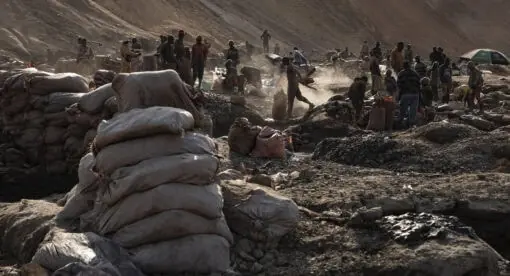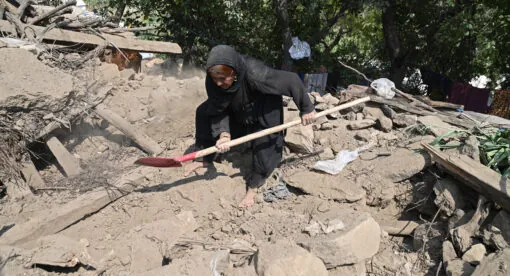Listen to article
News that Lebanon and Israel plan to deposit with the U.N. the coordinates of an agreed line separating their respective exclusive economic zones in the eastern Mediterranean Sea is welcome. The American mediator, Amos Hochstein, deserves praise for his patience and persistence. Ideally, the arrangements he has brokered will be brought into force before Israel’s parliamentary elections on Nov. 1.
For Lebanon, the apparently successful American mediation could be a turning point. With the possibility of Israel-Lebanon combat at sea all but eliminated, international energy companies would have the requisite confidence to explore Lebanon’s side of the seabed to see if marketable quantities of natural gas exist. Even if they do, it might take five years or more for Lebanon to receive revenues from its gas fields: five years for patriotic Lebanese to oust a corruptly incompetent political class (protected by Hezbollah) to ensure that revenues are not simply stolen.
For Israel – assuming it ratifies the maritime separation line and sustains it after the elections – the arrangement goes far toward ensuring that the land-based armed provocations of Hezbollah will not be extended out into the Mediterranean. This is important, as Israel has ambitious hopes and plans for the marketing of its natural gas to Europe. Capital being a coward, the possibility of armed mayhem at sea is obviously not something that attracts investors.
Indeed, some press coverage leading up to the acceptance of the American-mediated results assumed that Hezbollah would oppose any understanding between Lebanon and the “Zionist Enemy” and would have to be begged to stand down and accept a deal. Yet, beginning in 2011, Secretary-General Hassan Nasrallah has made it clear that Hezbollah would not scuttle the fruits of Lebanese diplomacy. He had (and has) no intention of being labeled the skunk at what some would consider a garden party featuring the showering of riches on the Lebanese people. Indeed, in recent months he has positioned himself as the hero – the launcher of drones – pressuring Israel into accepting Lebanon’s terms. Nasrallah is aware that many Lebanese – including members of his constituency – consider him to be the main pillar protecting and propping up a coterie of corrupt politicians willing, in return, to endorse the ersatz “Lebanese Resistance.”
Now that the leaders of the two countries have signed on to the arrangement, Nasrallah’s contrived victory lap on Lebanese TV may complicate matters in Israel. Prime Minister Yair Lapid finds himself in the unenviable position of being accused by his electoral opponent and predecessor, Benjamin Netanyahu, of having caved into Nasrallah’s threats. And Nasrallah agrees fully with Netanyahu. Will Bibi uphold the agreement if he forms the next government? My sense is that he will, with reluctance.
Indeed, Netanyahu accepted an American-proposed compromise 10 years ago not significantly different from the one accepted by Lapid. The American proposal then would have conveyed to Israel 45 percent of the area in dispute. Lapid conceded that 45 percent by accepting Lebanon’s “line 23” claim in full and agreeing Lebanon could fully exploit the untested “Qana” (also known as “Sidon”) field spilling over line 23, in return for monetary compensation from whatever energy company does the eventual drilling. It is worth noting that Israel could have had line 23 a decade ago, and (assuming marketable quantities of natural gas) Lebanon today would have been receiving revenues for the past three to five years. It is also worth noting that the focus of the American mediation returned in the end to the mutual acceptance of a maritime separation line after a gratuitously time-consuming attempt to “unitize” the entire disputed area.
Even if Israel ratifies and sustains the arrangement, it is not likely that a maritime line separating the exclusive economic zones of two states officially at war will, on its own merits, lead toward normalization. On the surface there are no bilateral issues so complex or problematic as to render Lebanon-Israel peace impossible. What makes it impossible for the foreseeable future is that Nasrallah represents the Islamic Republic of Iran in Lebanon, and he possesses the ability to kill any Lebanese leader advocating peace talks with Israel. A strong and imaginative Israeli leader might expose Nasrallah by putting on the table for peace discussions the whole rationale for the “Resistance” – the Shebaa Farms and Kfar Shouba Hill strip of the Golan Heights, claimed by Hezbollah to be occupied Lebanese territory. And Arab states at peace with Israel and part of the Abraham Accords could do their part in supporting would-be peacemakers in Lebanon.
Still, the arrangement brought about by American mediation, blessed by Lebanon’s “three presidents,” and accepted by the prime minister of Israel is, on its own merits, equitable and positive. For Israel, the challenge will be to approve and sustain it. For Lebanon – assuming marketable quantities of natural gas can be found – the challenge will be to ensure that eventual revenues benefit all Lebanese. The late Mohamed Chattah wanted an “Alaska” system, one diverting checks around the politicians directly to Lebanese citizens. Another approach would be for the International Monetary Fund and friends of Lebanon to advance prospective revenues to a country that desperately needs money now, in return for a comprehensive reform package and strict international oversight. The arrangement reached is fine. For Lebanon, however, the path forward will be perilous, as there may be real money at stake.
Ambassador Frederic C. Hof is Bard College’s Diplomat-in-Residence, and is the author of Reaching for the Heights: The Inside Story of a Secret Attempt to Reach a Syrian-Israeli Peace. He served as ambassador and special advisor for transition in Syria under President Barack Obama, with a distinguished career at the United States Army and the Department of State.
The views expressed in this article are those of the author and not an official policy or position of the New Lines Institute.






